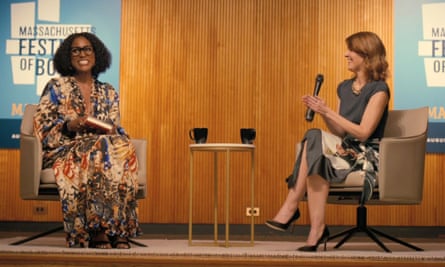A
A few years back, I entered a large bookstore in central London with the intention of locating my book and signing a few copies before its upcoming release, as is often recommended for authors. My book was about money, which was clearly stated in both the title and description on the jacket. However, when I asked a bookseller where I could find it, he informed me that he had placed it in the race studies section. When I questioned this classification, he became defensive and his colleague nearby visibly cringed. As time passed, I came to see this encounter as a perfect representation of how the book industry perceives Black writers – ridiculous and almost laughable, yet sadly not uncommon. To my surprise, while reading Percival Everett’s novel Erasure a few months ago, I discovered that the exact same scenario was being played out.
Everett is a highly productive writer with a unique style, having written over 30 books, including The Trees which was shortlisted for the 2022 Booker Prize. His previous works have ranged from allegorical zombie horror to a spy story, and his upcoming novel James is a retelling of The Adventures of Huckleberry Finn from the perspective of enslaved Jim. Erasure, published in 2001 and considered one of his greatest works, has now been adapted for the screen by former journalist turned screenwriter Cord Jefferson. The resulting film, American Fiction, is a sharp satire that criticizes the publishing and media industries’ constant demand for stereotypical “Black” narratives – or as one character puts it bluntly: “white publishers craving Black trauma porn”.
The story centers on Thelonious “Monk” Ellison (portrayed brilliantly by the grumpy yet endearing Jeffrey Wright), a novelist who becomes frustrated with the publishing industry’s preference for clichéd “hood lit” themes rather than his own more sophisticated literary works. In a mischievous act of rebellion, Monk decides to write a novel filled with stereotypical “ghetto” tropes as a form of satire and protest against the industry. To his surprise, the novel is embraced by the supposedly progressive white publishing world and he receives a large book advance. However, things become complicated when Monk submits the novel under a pseudonym, leading to a conflict between his disgust towards the industry, his own actions, and his need for financial stability.
When discussing the reception of his work, Everett states that white America tends to focus on the race of the creator. He believes that his exploration of race is not about fitting into societal categories, but rather reflects his identity as an American. In fact, he argues that any serious American novel will inevitably touch upon issues of race. He also points out the lack of representation of Black characters in the popular TV show Friends, which he sees as a reflection of America’s idealized self-image.
The upcoming film American Fiction is generating a lot of buzz for 2024, but the book it’s based on, Erasure, may not seem like the typical choice for a screen adaptation. In today’s Hollywood, there is a preference for high-budget blockbuster films based on existing intellectual property or easily franchise-able reboots. However, for Jefferson, the connections he found between Erasure and his own life were so strong that he was inspired to write his first full-length screenplay. “Have you ever come across a book that seemed like it was written just for you?” he wonders. “That’s exactly how I felt when I read [Erasure].”
He is discussing the themes of professionalism in Erasure, as well as its exploration of complex family dynamics such as tensions between siblings, caring for sick parents, and dealing with distant father figures. He personally related to these themes so much that it began to feel unsettling. When he first started writing for television almost ten years ago, he made sure to establish clear boundaries with his agents, stating, “If you only send me to auditions for ‘Black’ shows, I will terminate our relationship. I’m sure you don’t treat your white clients that way – only sending them to projects that fit their racial profile.” Having previously worked as a journalist, he was tired of constantly being assigned to cover stories about racism, as he expressed in a popular essay in 2014. He wanted to avoid being pigeonholed into only writing about race in his television career.
He didn’t need to worry, as he went on to write for a variety of prestigious TV shows such as Succession, The Good Place, and Masters of None. His decision to write a film, American Fiction, came after winning an Emmy in 2020 for his work on HBO’s Watchmen. The result is an impressive movie that would be considered a success for any filmmaker, let alone a newcomer. It is heartfelt, darkly humorous, rebellious, and intelligent, featuring a talented cast including Tracee Ellis Ross, Issa Rae, Sterling K Brown, and Erika Alexander. It turns the topic of race, which is typically portrayed in a negative light, into an entertaining drama.

It is intriguing that the American Fiction adaptation of Monk’s parody book chooses to remain true to the literary style that was originally satirized by Erasure. This is notable considering the current publishing trends for “hood lit” (as seen in 1996’s Push by Sapphire) have significantly decreased in popularity since Everett’s novel was released over 20 years ago. However, as the literary establishment has shifted towards imposing limitations on Black writers, often forcing them to focus on their identities or experiences with racial trauma, the outdated nature of the film’s approach does not diminish its overall message.
American Fiction accurately portrays the various anxieties and minor injustices experienced by writers in a humorous manner. A name tag with a misspelled name at a poorly attended literary festival panel is relatable, as is the protagonist Monk’s resentment towards successful authors who have “played the game”. He particularly dislikes Sintara Golden, who is portrayed as both slyly subservient and cynically self-aware. Golden’s bestseller, We’s Lives in da Ghetto, serves as a model for Monk’s own ghetto fanfiction.
Jefferson chose to emphasize the comedic elements in Everett’s text and even personally encouraged the audience at the screening I attended to laugh, specifically addressing the white individuals in attendance and giving them permission to find humor in his treatment of race. This was a deliberate decision on Jefferson’s part, likely stemming from his own experiences growing up in Tucson, Arizona where he was one of the few Black or biracial individuals in his community. He recalls watching Spielberg’s historical drama about enslaved people, Amistad, with his family in a nearly empty theater and questioning if they were the intended audience for the film.
The film uses comedy as a clever tactic to address race and how it is perceived in our society, without coming across as overly critical. This allows for a refreshing take on the topic, as many are growing tired of constant discussions about race. Other satires, such as Hollywood Shuffle and Bamboozled, serve as inspiration for this film. The director, Jefferson, wanted to create a welcoming atmosphere for viewers to engage in the conversation about race.
However, does this urge suggest that American Fiction runs the risk of becoming the very thing it is mocking – namely, stories about Black individuals tailored for the white perspective that solely depict the Black experience in relation to white individuals? This trend has been increasingly noticeable, particularly since 2020, in both the publishing and journalism industries within my own field, where the type of work created by Black authors that is favored by primarily white gatekeepers often places racism – and thus, white individuals – at or near its core, even if only as hindrances to Black self-discovery.
Jefferson is also aware of the danger in perpetuating white-saviour narratives, which have been heavily promoted by Hollywood in movies about slavery or civil rights. These narratives often serve to absolve white audiences from their own racism, allowing them to distance themselves from more overt forms of discrimination like a Ku Klux Klan member burning a cross on a lawn. However, as Monk’s literary agent points out, white people may claim to want the truth, but ultimately they are seeking absolution.

Jefferson states that he had hoped to avoid a certain direction in the film. He did not want it to appear as though it was about Black individuals, but instead, it centers around white individuals and pushes the Black characters to the sidelines. This was something that he contemplated extensively. As a result, American Fiction is filled with irony and maintains a humorous self-awareness throughout. At one point, Monk sarcastically comments to the white editor who has obtained his book: “I’m sure the white people in the Hamptons will love it.” This comment seems to be a commentary on how the movie, of which he is unknowingly the main character, will be received. It highlights the cyclical nature of creating art that critiques white people in a society shaped by the events following George Floyd’s death.
American Fiction avoids falling into the trap of solely focusing on white liberal concerns by expanding its subject matter beyond race. While there has been much discussion surrounding the film’s portrayal of race, viewers may be taken aback by the significant portions of the movie that delve into the struggles of a family in turmoil. This highlights the idea that racism is not the sole defining factor of Black identity. It is likely that the film has been promoted in this way, as it is known that white audiences may not be drawn to a movie that appears to center around the mundane experiences of typical Black individuals facing personal issues. In fact, it is unlikely that such a film would even be approved for production.
Monk’s position of relative privilege also allows him to subtly comment on the dynamics of class within the community. As a middle-class college professor, he unfortunately has a tendency to look down on others, and his portrayal of low-income Black America is borderline offensive with its focus on “deadbeat dads, rappers, crack”. It is unclear how much of this is his personal perspective and how much is simply a reflection of society’s prejudices, as part of his literary trickery. However, Jefferson makes it clear that this is not his own belief, as he points out that his film is not meant to criticize the type of Black art that Monk holds in disdain, but rather to challenge its dominance.
“When we first met, Jeffrey [Wright] immediately expressed his concern about avoiding a film that promotes respectability politics or follows the “talented tenth” or Bill Cosby’s “pull up your pants” ideology. This solidified our shared vision for the film and reassured me that he was the perfect fit for the role of Monk.” Everett also shares a similar sentiment when discussing his novel Erasure: “My argument was never that this type of work is not art. My issue was that it was the only representation available and it reduced the African American experience to one singular aspect.”
With five Oscar nods and a Bafta nod for its adapted screenplay, as well as two Golden Globe nods, it’s safe to say that American Fiction is shaping up to be a contemporary masterpiece. Beyond the awards circuit, it is sure to spark lively discussions, with some conservative critics hailing it as a win for “anti-woke” themes. However, in my opinion, it closely aligns with the conversations my “woke” peers and I have been having for years.
Despite it all, I find myself pondering a multitude of uneasy and intricate inquiries even after the credits have ended. How do I differentiate between staying true to oneself and catering to others? Should I moderate my disgruntlement towards Black writers who conform to societal norms? Is it strange that the white individuals in the theater were laughing so loudly? Every question leads to two more and my conclusions vary each time. It seems that this is exactly what the movie intended to provoke.
The latest publication from Otegha Uwagba is titled “We Need to Talk About Money” and was released by Fourth Estate.
Source: theguardian.com





















